Article by Alice Bardos in Berlin // Thursday, Apr. 7, 2016
It takes all of about five seconds for enticing uncanniness to fade into guilty mental admission in Martin Böttger’s ‘Vyger’. His vibrantly painted, alienesque sculptures can take the viewer down many parallel tangents. The most likely destination for millennials is a grotesque set of memories of a popular glossy, self-mutilation culture, including that of television shows such as ‘Extreme Makeover’, ‘The Swan’, and MTV’s ‘I Want a Famous Face’. Those fads are now in some ways disconnected from the present, as their popularity has ebbed. In the exhibition, their reoccurrence through allusion gives way to a reflection on the beauty and ugliness of seeking perfection and what its prospects are for the future, given our rate of technological biomedical progress.
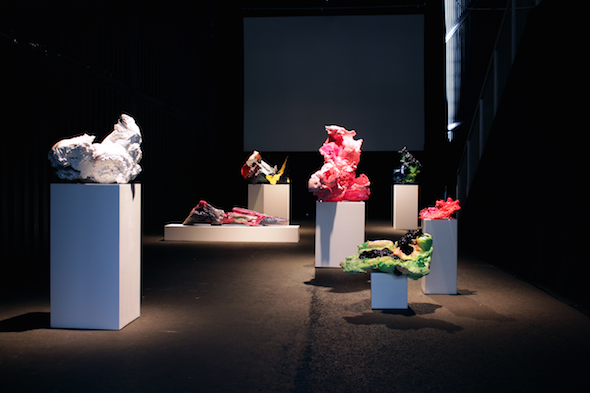
Martin Böttger: ‘Vyger’, 2016, Installation View // Courtesy of the Artist and Platoon Kunsthalle
Böttger’s sculptures are a violent arrangement of polyurethane, styrodur, epoxy, acrylic colour and spray paint. At first glimpse associations branch out to palimpsest forms of microscopic life; mold spores and coral reefs. The tone begins to turn slightly when textures of musculature draw upon the look of meat, in the form a leg of lamb or a slab of jamon, and the curiosity it incites, about whether you, too, look like that under the clothing of your own skin.
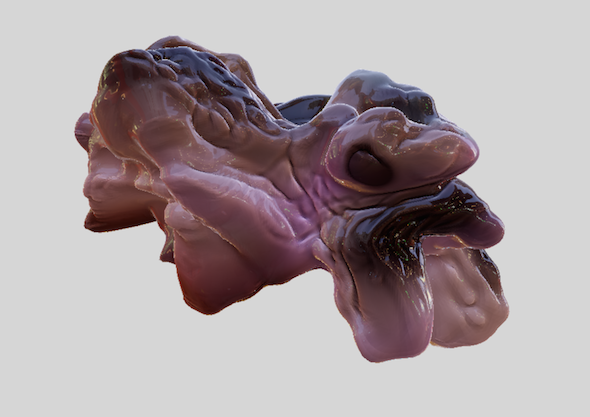
Martin Böttger: ‘Vyger’, Computer Rendering // Courtesy of the Artist and Platoon Kunsthalle
Grim aesthetic connections to visceral anatomy and its likely backseat place in the viewer’s mind subtly trickle and build throughout the exhibition. Those bags of glossy fat with air bubble cavities pressing up against a clear bag—used to claim a contestant’s post-cosmetic surgery victory over obesity—have a presence too. These are things that most people once took as normal and acceptable because their appearance and practice stemmed from medical and health fields. “If a doctor did it with cutting edge technology, then it must be good for us.” Near-subconsciously we all agreed without a word.
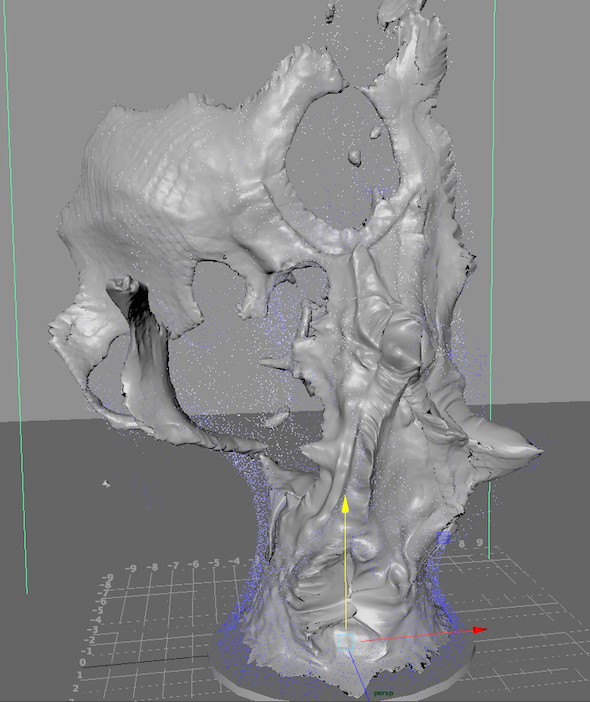
Martin Böttger: ‘Vyger’, Computer Rendering // Courtesy of the Artist and Platoon Kunsthalle
However, the show isn’t just about how the more naive progress and science-oriented paradigm of ten years ago omitted certain perspectives at the expense of critical thinking, as well as emotional and psychological health. Though this point does offer the invitation for viewers to reflect about their own prejudice against other cultural traditions. An acknowledgement can be made that all cultures have their own form of tunnel vision and judgement perhaps isn’t the best form of addressing these topics. The presence of those polyps of microbial life on top of the more chilling fleshy shapes, adds notes of the longevity and tenacity of life.
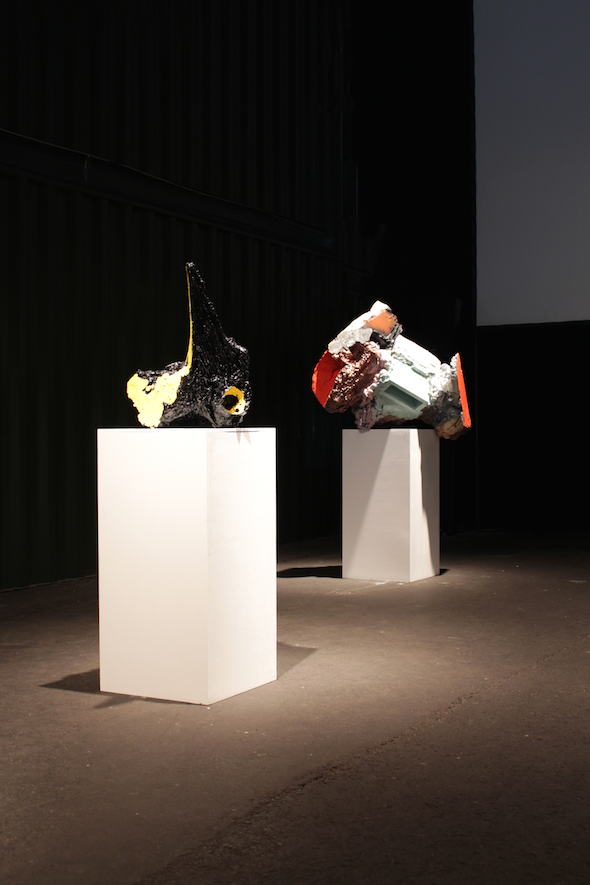
Martin Böttger: ‘Vyger’, 2016, Installation View // Courtesy of the Artist and Platoon Kunsthalle
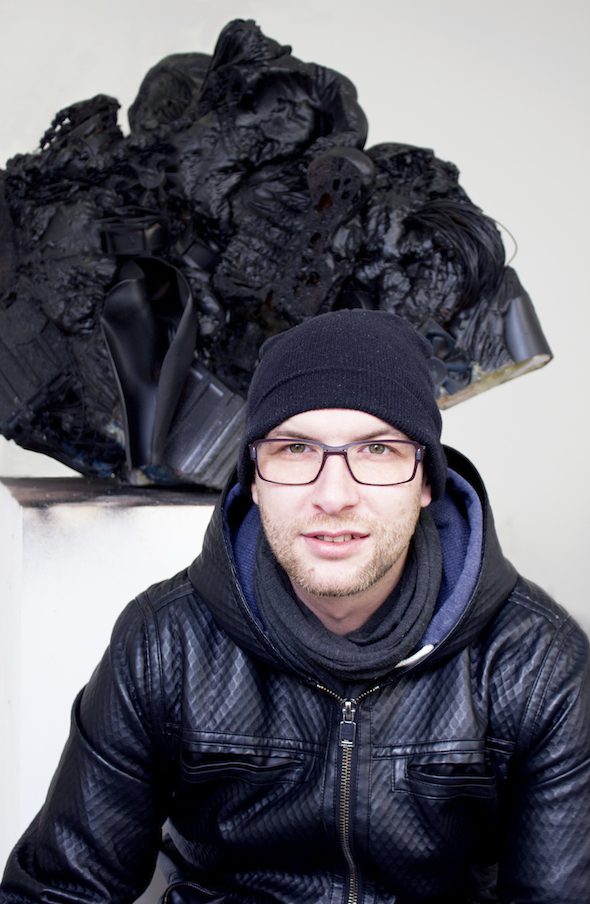
Martin Böttger: ‘Portrait’ // Courtesy of the Artist, Platoon Kunsthalle, and Photographer Oliver Kittmann
Though in this case perhaps it’s not physical life so much as ideological life. Plastic surgery in many ways is about the surface appearance, but perhaps Böttger’s inclusion of cross-sections of his materials speaks to the idea that he is digging deeper into medical practice. One piece—with its both geometric and organic appearance—looks bionic. Here, the artist is playing with the ideas of technology, medicine, the body and the future. The combination of all of these themes blends into the questioning of how much of our under-critical past has become a scar below the surface of our skin, hindering our overall potential to be ethical and holistically healthy.
Medicine and surgery have always been the tempestuous meeting place of technology and morality. Not long ago, lobotomizing and sterilizing people were standard ways of dealing with mental health afflictions. In a paradigm where computers are becoming permanent additions to the human body, Böttger is drawing on our emotional connections to our own pasts, to question the potential hazards of the future through a vivacious and borderline offensive aesthetic display.
Exhibition
PLATOON KUNSTHALLE
Martin Böttger: ‘Vyger’
Exhibition: Apr. 01–08, 2016
Schönhauser Allee 9, Berlin, click here for map



















